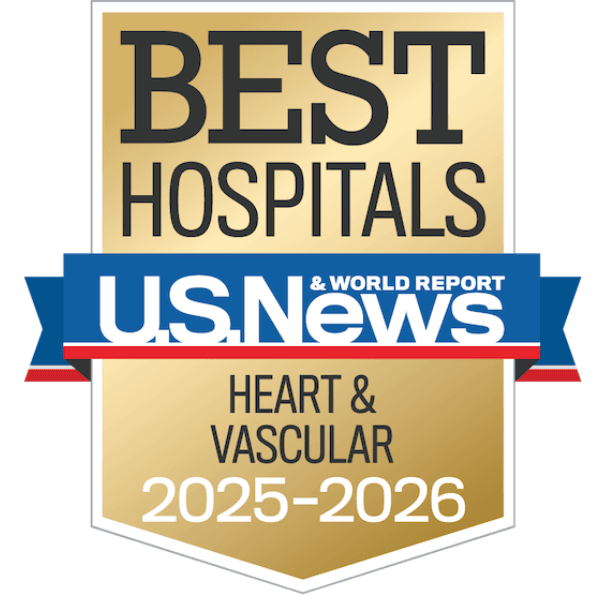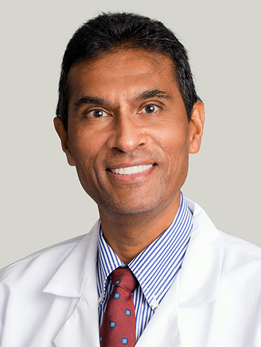Bloodless Heart Surgery
[MUSIC PLAYING] I was a very healthy 47-year-old that was very active. I was active in my ministry. I enjoyed outdoor activity. And I would come to and drop out and come to. So they came again and got me. And yeah, that's when it got really scary.
So due to my faith, I don't take blood transfusions. So they weren't willing to-- they weren't able to work to do that for me.
The University of Chicago was actually on a list that we have that would accept ones like Lisa to do bloodless surgery. And so we contacted the hospital liaison committee up here. And it just so happens that they worked closely with Dr. Jeevanandam.
Just so, I mean, really comforting. He was willing to do what I needed is-- and respect my faith.
I think the biggest thing is they were just open and honest with me. They would tell me, this is what's happening.
And, you know, we just became part of the hospital, so to speak. You know, the group and the nurses would come by, and they knew us by name, and they talked to us. So I think that was the biggest thing, is they treated us like family.
Each month that goes by, I just stay very active, walk a lot. And you just get stronger and stronger. But what I'm looking forward to about being home is being with my family and getting to be with my son-- for about a month before he gets married in May. So I'm thankful that I'll be there.
Advanced Bloodless Cardiac Surgery
The University of Chicago Medicine’s Bloodless Heart Surgery Program is at the forefront of heart care every day, pushing the boundaries of experience and innovation to perform the most complex bloodless heart surgeries. We take pride in looking beyond typical treatments to find our patients a solution that not only makes their particular preferences paramount, but also delivers high-quality care. By offering bloodless heart surgery (or transfusion-free heart surgery), we perform life-saving surgery without compromising our patients’ religious or personal reasons for needing “no blood” surgical or medical treatment. Our patients receive individualized treatment plans and personalized services that address and accommodate their wishes regarding transfusion and replacement blood products.
UChicago Medicine’s willingness to take on more complicated cases over the last several decades is one of the many reasons we draw patients nationwide. We are one of the few hospitals with a bloodless cardiac surgery program that performs blood free heart transplants and ventricular assist device surgery for congestive heart failure patients, in addition to having a bloodless kidney transplantation program. Our multidisciplinary team is led by one the most respected cardiac surgeons in the country, and we have saved hundreds of patients who desperately needed heart surgery. The expert team of cardiac surgeons, anesthesiologists and hematologists is committed to offering alternative therapies for “no blood” patients with heart disease that enable them to return to active, full lives.
What is Bloodless Surgery?
Bloodless cardiac surgery is a safe alternative for patients who have serious heart conditions but cannot or choose not to receive any blood or blood products (red cells, white cells, plasma or platelets). During bloodless heart surgery, our physicians use meticulous surgical techniques and innovative procedures that minimize surgical blood loss and avoid the need for a transfusion during surgery. And because we understand how important it is to preserve our patients’ self-respect and legal rights, we treat each patient as an integral part of the health care team. Our doctors work with each patient individually to develop a personalized bloodless surgery strategy.
To prepare for transfusion-free surgery, we might ask our patients to take certain measures designed to maximize their blood counts before the procedure, including:
- Increase iron through dietary changes and supplements
- Stop smoking and drinking alcohol
- Take vitamins that compliment blood optimization (folic acid)
- Temporarily cease the use of over-the-counter pain medication (aspirin, ibuprofen) and anti-coagulants (warfarin), and supplements like vitamin E and fish oil
- Take medications (Epogen) to improve blood counts
Blood-Sparing Surgical Techniques
Our experts deliver first-class care by combining the highest level of skill with the latest techniques, including:
Cell Saver: This machine collects blood that is lost during surgery and recycles it back into the patient’s body. The Cell Saver will remove any debris and other contaminants from the blood and separate the red blood cells to be returned to the patient through an intravenous line.
Cardiopulmonary Bypass: The heart-lung machine is used to divert the blood and add oxygen to it before returning to the heart. This replaces the function of the lungs and is primarily used so the heart can be stopped for surgery.
Hemodilution: Before surgery a particular amount of concentrated blood is drawn from the patient and the same amount of fluid is infused into the patient’s body to dilute their blood so there is less blood lose during surgery. After surgery, the concentrated blood is returned to the patient’s body
Benefits of Bloodless Surgery
Blood-sparing (or blood conserving) cardiac surgery offers patients a transfusion-free alternative that features a wide range of advantages besides the lack of reliance on national blood banks. Patients who choose bloodless medicine can experience positive advantages like:
- Avoidance of blood-borne viruses and infections through transfusion
- Stronger immune system after surgery without a transfusion
- Prevention of inflammatory and allergic reactions through blood transfusion
- Fewer reactions from blood stored for a longer period of time
- Precludes hemolytic transfusion reactions caused by donor blood antibodies after transfusion
Interested in receiving more information about bloodless heart surgery?
If you would like to join our bloodless surgery community, you can subscribe to our newsletter to receive the latest information about heart disease and bloodless treatments.
Subscribe Now
Nationally Ranked in Cardiology, Heart Surgery and Vascular Surgery
According to U.S. News and World Report, the University of Chicago Medicine's Heart and Vascular programs are among the best in the nation.
Learn more about our national heart and vascular rank.Our Bloodless Heart Surgery Team
Valluvan Jeevanandam, MD
Director, Heart and Vascular Center
Chief, Section of Cardiac Surgery
Cynthia Chow Professor of Surgery
Colleen LaBuhn, MSN, FNP-C, CCRN
Executive Director, Heart and Vascular Center
Bloodless Heart Surgery APNs
- Calvin Adatsi, APN
- Edith Gonzales, APN
Bloodless Surgery Nurse Navigator
- Allison Nowak, RN
Bloodless Coordinators
- Deanna Bassette, APN
- Maureen Wilson, RN
Lane Jenkins Received Bloodless Heart Transplant
When no West Coast hospital would accept him as a patient, Lane Jenkins found UChicago Medicine for his complex, bloodless heart transplant that respected his religious views as one of Jehovah's Witnesses.
[MUSIC PLAYING] I would say, before my activities were always been golfing, basketball, bowling. And I felt to the point where I couldn't do any of those things again. Fatigue, shortness of breath. It's extremely important based on Bible principles that blood is sacred. We view blood as sacred. And it's not that we don't want to live or get the best medical care possible. No, it's just that is what is outlined in God's word, the Bible.
So for me, it's extremely important. And it's a life decision that I will not take blood. And we have a hospital liaison committee. And they had recommended University of Chicago as one of the places that was definitely excellent in doing bloodless surgery. And because of that, their team reached out to me here in Chicago. They reached out to my wife and myself, explaining exactly what they do, exactly what time frame that they do it in.
And based on the recommendation of the HLC and their representatives, then I was able to make a decision. Definitely, Jehovah was able to guide me in the right direction. And that's one reason why we chose here at the University of Chicago.
He went up and down the West Coast. Went to other programs that say they do bloodless surgery but the results weren't great and they weren't really interested in taking care of him, because not only did he need bloodless surgery, he was also ill. And his pressures in his heart were very high. His output was low. And he was in borderline kidney failure.
And so we actually spoke to his cardiologist per the request of the family. And even the cardiologist when he spoke to Dr. Jay said, are you guys sure you can do this because he has this and this. And Dr. Jeevanandam said, yeah, we can do it.
My goal when I was in the hospital, I kept telling myself, I got to do what I have to do so I can get back home to my babies. Being a dad with two girls is a little sentimental. But I kept telling myself, I got to get back home to my babies, I got to get back home to my babies.
What makes us able to do these patients that other people won't do is when you have a good program, you can have a certain margin of error. But with patients who need very, very tight margins of error, like almost no error at all, you need to have a superlative team. And that's exactly what we've done. So we've created a superlative team.
That starts with our cardiologists, and they understand what Jehovah's Witnesses need to go through. Then you have the surgical team. When we operate, it's not like every surgeon does this. So we have a specific group of surgeons, we have a specific group of physician assistant, nurses, perfusionists that take care of these patients.
And so everybody's in sync. Almost, you don't have to talk to each other because we all know what we're going to do. And know all the little things that we do to preserve blood. And we go after every single area where we can lose blood.
So I think within a week or so he got a heart, it worked out great. And his pressures were high in the beginning but we knew how to manage them even in Jehovah's Witness. Those pressures then normally came down when the heart was good. And he [INAUDIBLE]. I think, he left the hospital in a very short period of time, like 14 to 21 days. And he's doing great.
My life is, it's funny. It's a lot better. Not just a lot better, it's very, very good, it's fabulous actually. To be able to walk, to be able to even run a little bit now. i'm starting running. To be able to go play golf, to be able to do all the activities I was doing without being hampered with being tired or fatigued, those things, I can't describe the feeling. It is so wonderful to be able to do those things on a regular basis.
Because when you say heart transplant, everybody, your peers, your friends are like, heart transplant, that's major. But when you're at the University of Chicago, when you're there with the team, and you see how regularly they do these things, it puts you at ease.
Bloodless Heart Surgery Locations Near You
Request an Appointment
We are currently experiencing a high volume of inquiries, leading to delayed response times. For faster assistance, please call 1-773-702-2500 to schedule your appointment.
If you have symptoms of an urgent nature, please call your doctor or go to the emergency room immediately.
* Indicates required field

